初中英语外研版九下Module 4 Unit 1 You must be careful of falling stones.作业(含解析)
文档属性
| 名称 | 初中英语外研版九下Module 4 Unit 1 You must be careful of falling stones.作业(含解析) |
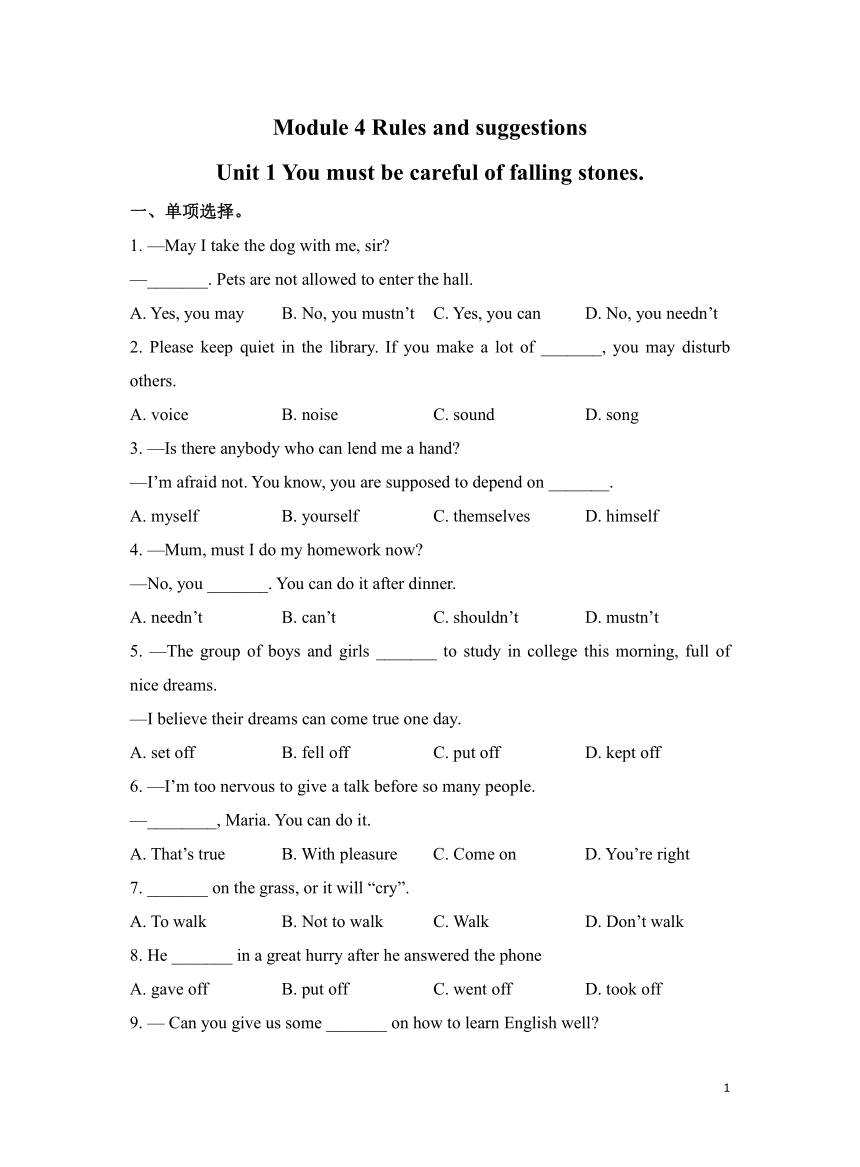
|
|
| 格式 | doc | ||
| 文件大小 | 67.0KB | ||
| 资源类型 | 教案 | ||
| 版本资源 | 外研版 | ||
| 科目 | 英语 | ||
| 更新时间 | 2023-08-30 17:07:55 | ||
图片预览

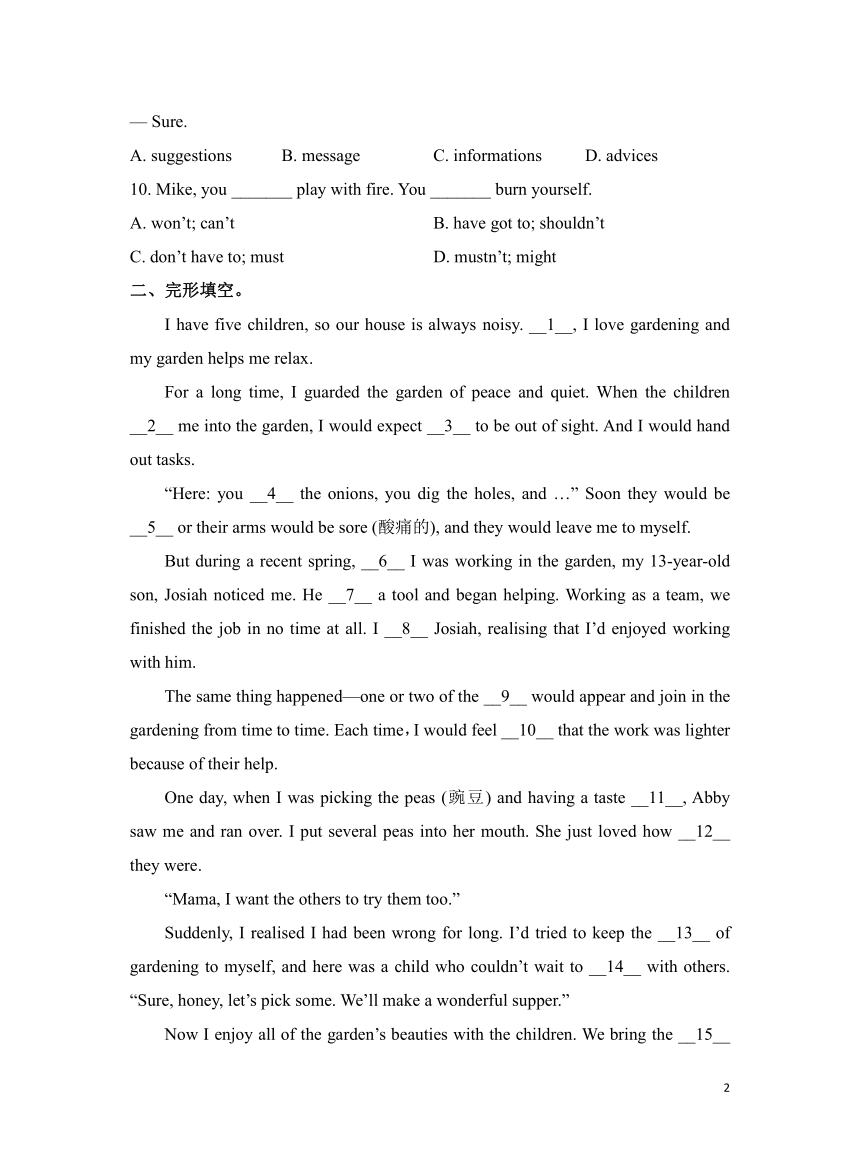
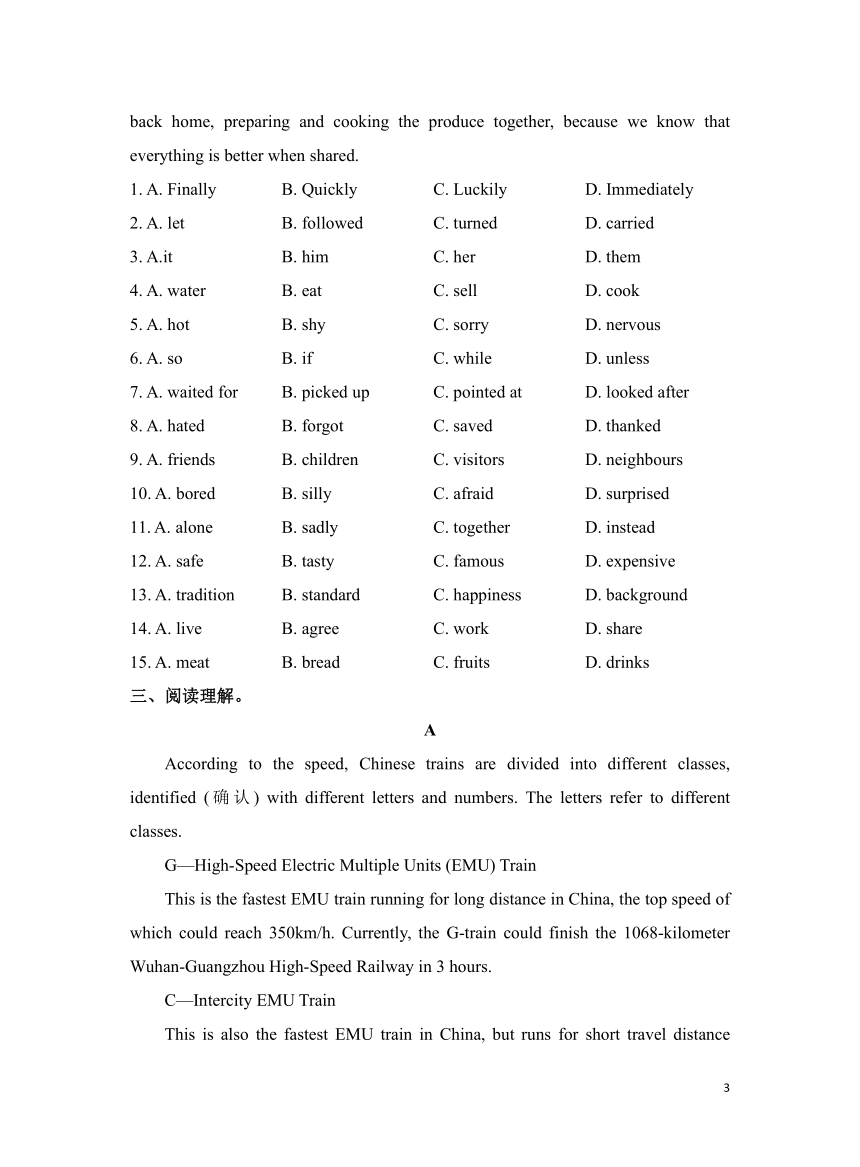
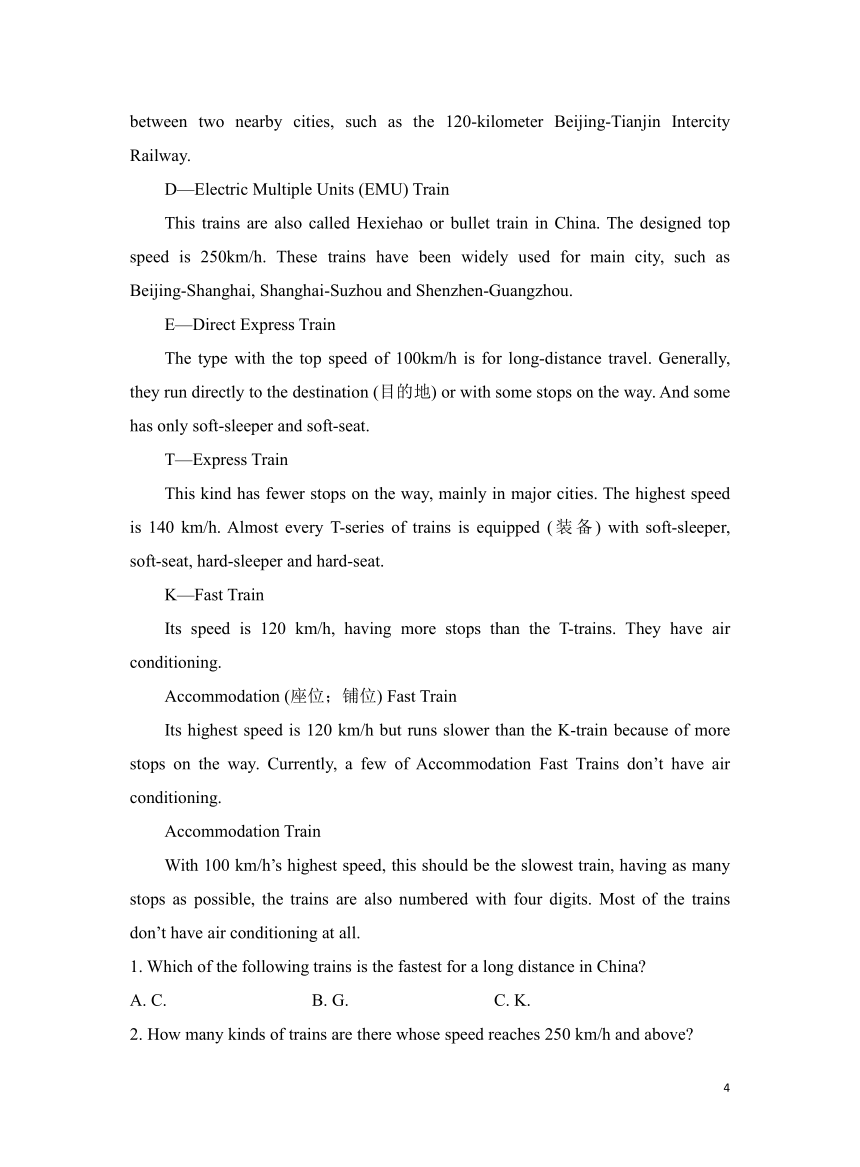
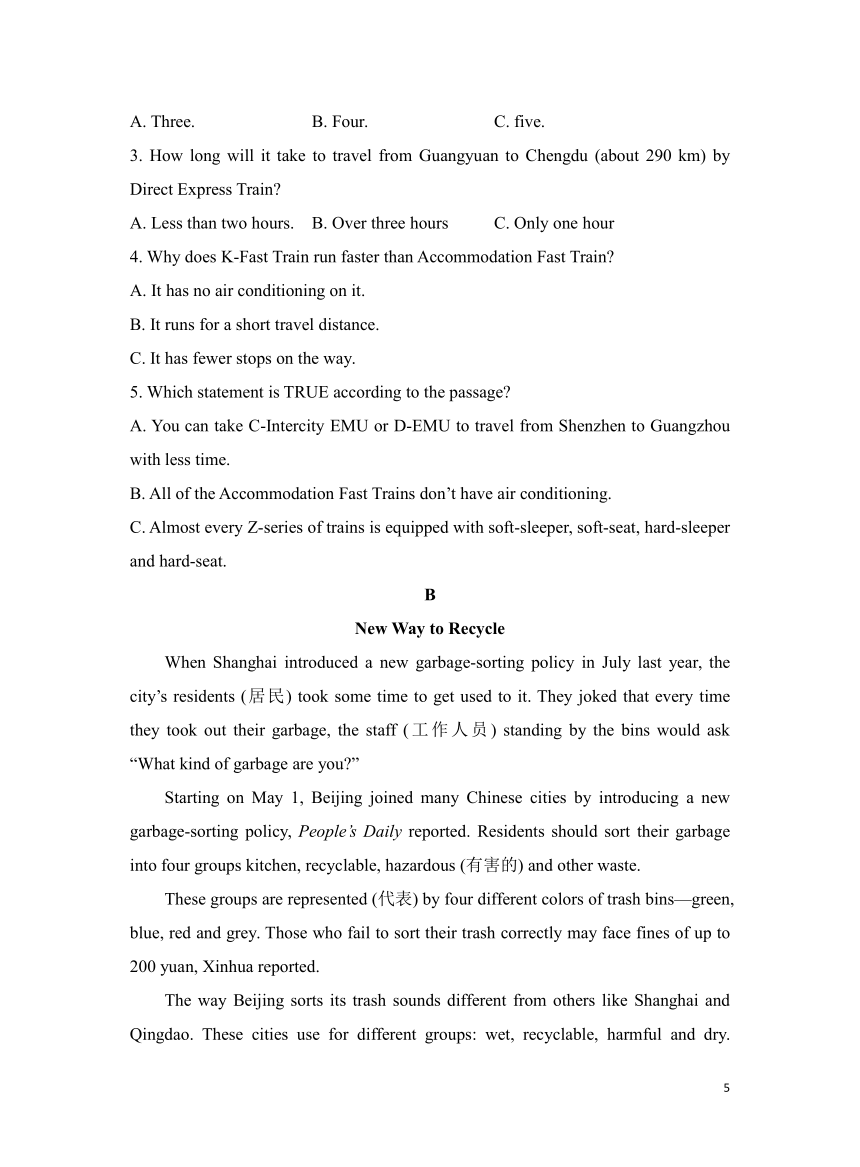
文档简介
Module 4 Rules and suggestions
Unit 1 You must be careful of falling stones.
一、单项选择。
1. —May I take the dog with me, sir
—_______. Pets are not allowed to enter the hall.
A. Yes, you may B. No, you mustn’t C. Yes, you can D. No, you needn’t
2. Please keep quiet in the library. If you make a lot of _______, you may disturb others.
A. voice B. noise C. sound D. song
3. —Is there anybody who can lend me a hand
—I’m afraid not. You know, you are supposed to depend on _______.
A. myself B. yourself C. themselves D. himself
4. —Mum, must I do my homework now
—No, you _______. You can do it after dinner.
A. needn’t B. can’t C. shouldn’t D. mustn’t
5. —The group of boys and girls _______ to study in college this morning, full of nice dreams.
—I believe their dreams can come true one day.
A. set off B. fell off C. put off D. kept off
6. —I’m too nervous to give a talk before so many people.
—________, Maria. You can do it.
A. That’s true B. With pleasure C. Come on D. You’re right
7. _______ on the grass, or it will “cry”.
A. To walk B. Not to walk C. Walk D. Don’t walk
8. He _______ in a great hurry after he answered the phone
A. gave off B. put off C. went off D. took off
9. — Can you give us some _______ on how to learn English well
— Sure.
A. suggestions B. message C. informations D. advices
10. Mike, you _______ play with fire. You _______ burn yourself.
A. won’t; can’t B. have got to; shouldn’t
C. don’t have to; must D. mustn’t; might
二、完形填空。
I have five children, so our house is always noisy. __1__, I love gardening and my garden helps me relax.
For a long time, I guarded the garden of peace and quiet. When the children __2__ me into the garden, I would expect __3__ to be out of sight. And I would hand out tasks.
“Here: you __4__ the onions, you dig the holes, and …” Soon they would be __5__ or their arms would be sore (酸痛的), and they would leave me to myself.
But during a recent spring, __6__ I was working in the garden, my 13-year-old son, Josiah noticed me. He __7__ a tool and began helping. Working as a team, we finished the job in no time at all. I __8__ Josiah, realising that I’d enjoyed working with him.
The same thing happened—one or two of the __9__ would appear and join in the gardening from time to time. Each time,I would feel __10__ that the work was lighter because of their help.
One day, when I was picking the peas (豌豆) and having a taste __11__, Abby saw me and ran over. I put several peas into her mouth. She just loved how __12__ they were.
“Mama, I want the others to try them too.”
Suddenly, I realised I had been wrong for long. I’d tried to keep the __13__ of gardening to myself, and here was a child who couldn’t wait to __14__ with others. “Sure, honey, let’s pick some. We’ll make a wonderful supper.”
Now I enjoy all of the garden’s beauties with the children. We bring the __15__ back home, preparing and cooking the produce together, because we know that everything is better when shared.
1. A. Finally B. Quickly C. Luckily D. Immediately
2. A. let B. followed C. turned D. carried
3. A.it B. him C. her D. them
4. A. water B. eat C. sell D. cook
5. A. hot B. shy C. sorry D. nervous
6. A. so B. if C. while D. unless
7. A. waited for B. picked up C. pointed at D. looked after
8. A. hated B. forgot C. saved D. thanked
9. A. friends B. children C. visitors D. neighbours
10. A. bored B. silly C. afraid D. surprised
11. A. alone B. sadly C. together D. instead
12. A. safe B. tasty C. famous D. expensive
13. A. tradition B. standard C. happiness D. background
14. A. live B. agree C. work D. share
15. A. meat B. bread C. fruits D. drinks
三、阅读理解。
A
According to the speed, Chinese trains are divided into different classes, identified (确认) with different letters and numbers. The letters refer to different classes.
G—High-Speed Electric Multiple Units (EMU) Train
This is the fastest EMU train running for long distance in China, the top speed of which could reach 350km/h. Currently, the G-train could finish the 1068-kilometer Wuhan-Guangzhou High-Speed Railway in 3 hours.
C—Intercity EMU Train
This is also the fastest EMU train in China, but runs for short travel distance between two nearby cities, such as the 120-kilometer Beijing-Tianjin Intercity Railway.
D—Electric Multiple Units (EMU) Train
This trains are also called Hexiehao or bullet train in China. The designed top speed is 250km/h. These trains have been widely used for main city, such as Beijing-Shanghai, Shanghai-Suzhou and Shenzhen-Guangzhou.
E—Direct Express Train
The type with the top speed of 100km/h is for long-distance travel. Generally, they run directly to the destination (目的地) or with some stops on the way. And some has only soft-sleeper and soft-seat.
T—Express Train
This kind has fewer stops on the way, mainly in major cities. The highest speed is 140 km/h. Almost every T-series of trains is equipped (装备) with soft-sleeper, soft-seat, hard-sleeper and hard-seat.
K—Fast Train
Its speed is 120 km/h, having more stops than the T-trains. They have air conditioning.
Accommodation (座位;铺位) Fast Train
Its highest speed is 120 km/h but runs slower than the K-train because of more stops on the way. Currently, a few of Accommodation Fast Trains don’t have air conditioning.
Accommodation Train
With 100 km/h’s highest speed, this should be the slowest train, having as many stops as possible, the trains are also numbered with four digits. Most of the trains don’t have air conditioning at all.
1. Which of the following trains is the fastest for a long distance in China
A. C. B. G. C. K.
2. How many kinds of trains are there whose speed reaches 250 km/h and above
A. Three. B. Four. C. five.
3. How long will it take to travel from Guangyuan to Chengdu (about 290 km) by Direct Express Train
A. Less than two hours. B. Over three hours C. Only one hour
4. Why does K-Fast Train run faster than Accommodation Fast Train
A. It has no air conditioning on it.
B. It runs for a short travel distance.
C. It has fewer stops on the way.
5. Which statement is TRUE according to the passage
A. You can take C-Intercity EMU or D-EMU to travel from Shenzhen to Guangzhou with less time.
B. All of the Accommodation Fast Trains don’t have air conditioning.
C. Almost every Z-series of trains is equipped with soft-sleeper, soft-seat, hard-sleeper and hard-seat.
B
New Way to Recycle
When Shanghai introduced a new garbage-sorting policy in July last year, the city’s residents (居民) took some time to get used to it. They joked that every time they took out their garbage, the staff (工作人员) standing by the bins would ask “What kind of garbage are you ”
Starting on May 1, Beijing joined many Chinese cities by introducing a new garbage-sorting policy, People’s Daily reported. Residents should sort their garbage into four groups kitchen, recyclable, hazardous (有害的) and other waste.
These groups are represented (代表) by four different colors of trash bins—green, blue, red and grey. Those who fail to sort their trash correctly may face fines of up to 200 yuan, Xinhua reported.
The way Beijing sorts its trash sounds different from others like Shanghai and Qingdao. These cities use for different groups: wet, recyclable, harmful and dry. Although their names are different, the groups are actually the same. Wet garbage in Shanghai is, in fact, kitchen garbage. And dry garbage is the same as other waste. China Daily reported.
To help residents sort their trash correctly, the Beijing government is offering online guidelines. If people don’t know how to throw away garbage, they can search for it on the WeChat account Guanchenglish (管城理事) to find out. By searching a key word or taking a photo, people can immediately find out which group their waste belongs to.
6. What do we know from this story
A. Garbage-sorting started in Beijing on May 1.
B. Garbage-sorting is being carried out nationwide.
C. Beijing’s garbage-sorting policy is the same as Shanghai’s.
7. Other waste is the same as ________ in Shanghai.
A. dry garbage B. recyclable garbage C. harmful garbage
8. If people don’t follow the garbage-sorting policy, ________.
A. they will be forced to learn the policy
B. they won’t be allowed to throw trash away
C. they may face fines
9. The last paragraph mainly explains ________.
A. the government’s suggestions about garbage-sorting
B. how to help residents sort their garbage
C. problems with Beijing’s garbage-sorting policy
10. We can read this article in ________.
A. a story book B. a guide book C. a newspaper
参考答案与解析
一、
1. B
【解析】问句的含义是“我可以带狗吗,先生”,根据答语中提到的“不允许宠物进入大厅”可推断,所缺的句子是B项“不,你不准(带狗进入大厅)”。
2. B
【解析】由空后的“你可能会打扰到别人”可知,此处指的是“制造很多噪声”,故选B。
3. B
【解析】联系上下文可知,此句句意为:你应该靠你自己,故选B。
4. A
【解析】——妈妈,我必须现在做作业吗 ——不,你不必。你可以晚饭后做。用must提问时,否定回答用needn’t/don’t have to/doesn’t have to。
5. A
【解析】——这群满怀美好梦想的孩子们今天早上出发去大学学习了。——我相信他们的梦想有一天会实现。set off出发;fall off数量减少;put off推迟;keep off避免吃(或喝、吸)某物。
6. C
【解析】情景交际法。句意:——我太紧张了而不能在这么多人面前作报告。——加油,玛丽亚,你能做到的。come on加油,表示鼓励对方,故选C。
7. D
【解析】句意:不要在草地上走,否则它会“哭泣”。祈使句的否定形式在动词原形前加don’t,故选D。
8. C
【解析】句意:接完电话他匆匆地离开了。go off“离开”符合句意。
9. A
【解析】句意:——你能给我们一些如何学好英语的建议吗?——当然。
A.建议;B.信息;C.消息;D.建议。根据这里只有A和B是可数名词,所以C和D的形式是错误的,C和D都是不可数名词,不能有复数形式,故排除;另外,B中的message当消息讲,给某个留的消息的意思,而A中的suggestions是意见,建议的意思,并且空前some,此空应填复数形式,此空故填suggestions,故选A。
10. D
【解析】句意:迈克,你不能玩火。你可能会烧伤自己。
本题考查情态动词。A.不会不能;B.必须,不应该;C.不必,必须;D.禁止;可能。第一空,根据句意可知,此空是禁止的意思,此空故填mustn’t,第二空,是表示猜测,应填might,故选D。
二、【解析】本文讲述作者一直以来喜欢独自享受花园里的工作,后来干活时孩子们的偶尔帮忙使作者感到意外的轻松和愉快。一次女儿艾比品尝豌豆时说的话使作者领悟到了与孩子们分享的巨大快乐。
1. C句意:我有五个孩子,所以我们家里总是很吵。幸运地是,我喜欢园艺,我的花园帮助我放松。A. Finally最后;B. Quickly快地;C. Luckily幸运地;D. Immediately立刻;马上。前后表示转折关系,通过排除,故答案为C。
2. D句意:很长时间我守卫着花园的宁静。A. painted绘画;B. guarded守卫;C. refused拒绝;D. described描述。根据上文花园帮助我放松,所以我“守卫”着这片宁静,故答案为B。
3. D句意:当孩子跟着我进入花园,我想让他们离开我的视线。我会分派任务。此处指代前文的children,所以用复数them代替,故答案为D。
4. A 句意:这样,你来浇洋葱,你来挖坑,你……。A. water;尧水;B. eat吃;C. sell卖;D. cook烹饪。根据前文hand out tasks 可知此处在分派花园里的活,只有“浇水”符合语境,故答案为A。
5. A 句意:很快他们就会很热,或者他们的胳膊累酸了,他们就会离我而去。A. hot热的;B. shy害羞的;C. sorry抱歉的;遗憾的;D. nervous紧张的。由or their arms would be sore可知此处说明孩子们干活之后的反应,故答案为A。
6. C 句意:但是在最近的一个春天当我在花园里干活的时候,我的13岁的儿子乔希亚注意到我。A. so所以;B. if如果;C. while当……时;D. unless除非;根据前后的逻辑关系,从句中的进行时态was working可知表示“正当……时候”,故答案为C。
7. B 句意:他拾起一个工具开始帮忙。就像团队一样,我们很快把活干完了。A. waited for等候;B. picked up拾起;C. pointed at指着;D. looked after照顾。根据宾语tool可知是“拿起”工具,故答案为B。
8. D 句意:我对乔希亚道谢,意识到我很享受与他一起干活。A. hated讨厌;B. forgot忘记;C. saved救;D. thanked感谢。根据后半句realizing that I’d enjoyed working with him可知ABC不符合语境,故答案为D。
9. B 句意:同样的事情发生了—不时有一两个孩子会出现,并加入园艺工作。A. friends朋友;B. children孩子; C. visitors访客;D. neighbors邻居。根据前文叙述可知乔希亚的行为带动其他的孩子也来帮忙,故答案为B。
10. D句意:每一次我都会感到惊讶,工作因为他们的帮助而变得更轻。A. bored无聊的;B. silly傻的;C. afraid害怕的;D. surprised惊讶的。此处描写作者的感受,根据从句that the work was lighter because of their help结合前文expect them to be out of sight可知作者对孩子们的帮忙的效果感到意外,故答案为D。
11. A句意:当我在摘豌豆,正一个人品尝的时候,艾比看见了,跑了过来。A. alone独自;B. sadly伤心地;C. together一起;D. instead代替;而不是。根据下文可知作者一个人品尝豌豆,故答案为A。
12. B 句意:我把几颗豌豆放进她的嘴里,她正好喜欢豌豆的美味。A. safe安全的;B. tasty美味的;可口的;C. famous著名的;D. expensive昂贵的;与前文的having a taste和put several peas into her mouth呼应,所以此处描述豌豆的口味,故答案为B。
13. C句意:突然,我意识到我错了很久了,我一直试图把花园的快乐留给我自己。A. tradition传统;B. standard标准;C. happiness幸福;D. background背景。对前文的总结,指花园给作者带来的“幸福”“快乐”,故答案为C。
14. D句意:这里有一个迫不及待与别人分享的孩子。A. live住;B. agree同意;C. work工作;D. share分享。根据上文“Mama, I want the others to try them too.”可知艾比要别的孩子也来尝一尝豌豆的味道,所以是“分享”,故答案为D。
15. C句意:现在,我和孩子们一起享受这花园的美,我们把果实带回家,一起烹制这次农产品,因为我们知道当分享的时候一切才会变得更好。A. meat肉;B. bread面包;C. fruits果实;D. drinks饮料。此处指花园里产出的“果实”,故答案为C。
三、A篇【解析】这是一篇说明文,在中国,火车因为速度不同而被分为不同的种类,文章介绍了中国的各种火车。
1. B细节理解题。根据第二段“G—High-Speed Electric Multiple Units (EMU) Train This is the fastest EMU train running for long distance in China”可知在中国远程的话,高铁G是最快的,故选B。
2. A推理判断题。根据第二段“the top speed of which could reach 350 km/h”,第三段“C—Intercity EMU Train This is also the fastest EMU train in China”以及第四段“The designed top speed is 250 km/h”可知时速超过或达到250 km/h的有三种列车,是高铁,城际列车和动车。故选A。
3. B推理判断题。根据“E—Direct Express Train The type with the top speed of 100 km/h is for long-distance travel. They run directly to the destination (目的地) or with some stops on the way”可知直达火车的时速是100 km/h,直达目的地或中途有一些停顿。由此推断从广元到成都,大约290公里的路程,要超过三个小时才能到达。故选B。
4. C细节理解题。根据“T—Express Train This kind has fewer stops on the way, mainly in major cities”以及“K—Fast Train Its speed is 120 km/h, having more stops than the T-trains”快车比普快跑得快一些是因为快车的中途停车比普快要少。故选C。
5. A推理判断题。根据“C—Intercity EMU Train This is also the fastest EMU train in China, but runs for short travel distance between two nearby cities”以及“The designed top speed is 250 km/h. These trains have been widely used for main city, such as Beijing-Shanghai, Shanghai-Suzhou and Shenzhen-Guangzhou”可知从深圳到广州坐城际列车或动车花的时间更少,A选项表述正确。根据“Currently, a few of Accommodation Fast Trains don’t have air conditioning”可知B选项表述错误。根据“Almost every T-series of trains is equipped (装备) with soft-sleeper, soft-seat, hard-sleeper and hard-seat”可知C选项表述错误。故选A。
B篇【解析】这是一篇记叙文,文章讲述上海以及北京的垃圾分类政策;垃圾如何分类以及不按照政策实行将受到的惩罚;政府为了帮助居民正确的垃圾分类而采取的网上指导措施。
6. A推理判断题。根据第二段“Starting on May 1, Beijing joined many Chinese cities by introducing a new garbage-sorting policy”可知A选项表述正确。B选项“Garbage-sorting is being carried out nationwide”垃圾分类在全国范围实施文中没有提到,B选项表述错误。根据第四段“The way Beijing sorts its trash sounds different from others like Shanghai and Qingdao”可知C表述错误。故选A。
7. A细节理解题。根据第四段“dry garbage is the same as other waste”可知其他垃圾就是干垃圾。故选A。
8. C细节理解题。根据第三段“Those who fail to sort their trash correctly may face fines of up to 200 yuan”可知没有按照垃圾分类的政策扔垃圾可能被罚款。故选C。
9. B段落大意题。根据“To help residents sort their trash correctly, the Beijing government is offering online guidelines”可知最后一段讲述帮助居民正确垃圾分类的举措,可概括为how to help residents sort their garbage。故选B。
10. C推理判断题。a story book故事书;a guide book指导手册;a newspaper一份报纸。根据“People’s Daily reported”,“Xinhua reported”以及“China Daily reported”可推断文章来自于新闻报道评述,可以在报纸上看到这篇文章。故选C。
1
Unit 1 You must be careful of falling stones.
一、单项选择。
1. —May I take the dog with me, sir
—_______. Pets are not allowed to enter the hall.
A. Yes, you may B. No, you mustn’t C. Yes, you can D. No, you needn’t
2. Please keep quiet in the library. If you make a lot of _______, you may disturb others.
A. voice B. noise C. sound D. song
3. —Is there anybody who can lend me a hand
—I’m afraid not. You know, you are supposed to depend on _______.
A. myself B. yourself C. themselves D. himself
4. —Mum, must I do my homework now
—No, you _______. You can do it after dinner.
A. needn’t B. can’t C. shouldn’t D. mustn’t
5. —The group of boys and girls _______ to study in college this morning, full of nice dreams.
—I believe their dreams can come true one day.
A. set off B. fell off C. put off D. kept off
6. —I’m too nervous to give a talk before so many people.
—________, Maria. You can do it.
A. That’s true B. With pleasure C. Come on D. You’re right
7. _______ on the grass, or it will “cry”.
A. To walk B. Not to walk C. Walk D. Don’t walk
8. He _______ in a great hurry after he answered the phone
A. gave off B. put off C. went off D. took off
9. — Can you give us some _______ on how to learn English well
— Sure.
A. suggestions B. message C. informations D. advices
10. Mike, you _______ play with fire. You _______ burn yourself.
A. won’t; can’t B. have got to; shouldn’t
C. don’t have to; must D. mustn’t; might
二、完形填空。
I have five children, so our house is always noisy. __1__, I love gardening and my garden helps me relax.
For a long time, I guarded the garden of peace and quiet. When the children __2__ me into the garden, I would expect __3__ to be out of sight. And I would hand out tasks.
“Here: you __4__ the onions, you dig the holes, and …” Soon they would be __5__ or their arms would be sore (酸痛的), and they would leave me to myself.
But during a recent spring, __6__ I was working in the garden, my 13-year-old son, Josiah noticed me. He __7__ a tool and began helping. Working as a team, we finished the job in no time at all. I __8__ Josiah, realising that I’d enjoyed working with him.
The same thing happened—one or two of the __9__ would appear and join in the gardening from time to time. Each time,I would feel __10__ that the work was lighter because of their help.
One day, when I was picking the peas (豌豆) and having a taste __11__, Abby saw me and ran over. I put several peas into her mouth. She just loved how __12__ they were.
“Mama, I want the others to try them too.”
Suddenly, I realised I had been wrong for long. I’d tried to keep the __13__ of gardening to myself, and here was a child who couldn’t wait to __14__ with others. “Sure, honey, let’s pick some. We’ll make a wonderful supper.”
Now I enjoy all of the garden’s beauties with the children. We bring the __15__ back home, preparing and cooking the produce together, because we know that everything is better when shared.
1. A. Finally B. Quickly C. Luckily D. Immediately
2. A. let B. followed C. turned D. carried
3. A.it B. him C. her D. them
4. A. water B. eat C. sell D. cook
5. A. hot B. shy C. sorry D. nervous
6. A. so B. if C. while D. unless
7. A. waited for B. picked up C. pointed at D. looked after
8. A. hated B. forgot C. saved D. thanked
9. A. friends B. children C. visitors D. neighbours
10. A. bored B. silly C. afraid D. surprised
11. A. alone B. sadly C. together D. instead
12. A. safe B. tasty C. famous D. expensive
13. A. tradition B. standard C. happiness D. background
14. A. live B. agree C. work D. share
15. A. meat B. bread C. fruits D. drinks
三、阅读理解。
A
According to the speed, Chinese trains are divided into different classes, identified (确认) with different letters and numbers. The letters refer to different classes.
G—High-Speed Electric Multiple Units (EMU) Train
This is the fastest EMU train running for long distance in China, the top speed of which could reach 350km/h. Currently, the G-train could finish the 1068-kilometer Wuhan-Guangzhou High-Speed Railway in 3 hours.
C—Intercity EMU Train
This is also the fastest EMU train in China, but runs for short travel distance between two nearby cities, such as the 120-kilometer Beijing-Tianjin Intercity Railway.
D—Electric Multiple Units (EMU) Train
This trains are also called Hexiehao or bullet train in China. The designed top speed is 250km/h. These trains have been widely used for main city, such as Beijing-Shanghai, Shanghai-Suzhou and Shenzhen-Guangzhou.
E—Direct Express Train
The type with the top speed of 100km/h is for long-distance travel. Generally, they run directly to the destination (目的地) or with some stops on the way. And some has only soft-sleeper and soft-seat.
T—Express Train
This kind has fewer stops on the way, mainly in major cities. The highest speed is 140 km/h. Almost every T-series of trains is equipped (装备) with soft-sleeper, soft-seat, hard-sleeper and hard-seat.
K—Fast Train
Its speed is 120 km/h, having more stops than the T-trains. They have air conditioning.
Accommodation (座位;铺位) Fast Train
Its highest speed is 120 km/h but runs slower than the K-train because of more stops on the way. Currently, a few of Accommodation Fast Trains don’t have air conditioning.
Accommodation Train
With 100 km/h’s highest speed, this should be the slowest train, having as many stops as possible, the trains are also numbered with four digits. Most of the trains don’t have air conditioning at all.
1. Which of the following trains is the fastest for a long distance in China
A. C. B. G. C. K.
2. How many kinds of trains are there whose speed reaches 250 km/h and above
A. Three. B. Four. C. five.
3. How long will it take to travel from Guangyuan to Chengdu (about 290 km) by Direct Express Train
A. Less than two hours. B. Over three hours C. Only one hour
4. Why does K-Fast Train run faster than Accommodation Fast Train
A. It has no air conditioning on it.
B. It runs for a short travel distance.
C. It has fewer stops on the way.
5. Which statement is TRUE according to the passage
A. You can take C-Intercity EMU or D-EMU to travel from Shenzhen to Guangzhou with less time.
B. All of the Accommodation Fast Trains don’t have air conditioning.
C. Almost every Z-series of trains is equipped with soft-sleeper, soft-seat, hard-sleeper and hard-seat.
B
New Way to Recycle
When Shanghai introduced a new garbage-sorting policy in July last year, the city’s residents (居民) took some time to get used to it. They joked that every time they took out their garbage, the staff (工作人员) standing by the bins would ask “What kind of garbage are you ”
Starting on May 1, Beijing joined many Chinese cities by introducing a new garbage-sorting policy, People’s Daily reported. Residents should sort their garbage into four groups kitchen, recyclable, hazardous (有害的) and other waste.
These groups are represented (代表) by four different colors of trash bins—green, blue, red and grey. Those who fail to sort their trash correctly may face fines of up to 200 yuan, Xinhua reported.
The way Beijing sorts its trash sounds different from others like Shanghai and Qingdao. These cities use for different groups: wet, recyclable, harmful and dry. Although their names are different, the groups are actually the same. Wet garbage in Shanghai is, in fact, kitchen garbage. And dry garbage is the same as other waste. China Daily reported.
To help residents sort their trash correctly, the Beijing government is offering online guidelines. If people don’t know how to throw away garbage, they can search for it on the WeChat account Guanchenglish (管城理事) to find out. By searching a key word or taking a photo, people can immediately find out which group their waste belongs to.
6. What do we know from this story
A. Garbage-sorting started in Beijing on May 1.
B. Garbage-sorting is being carried out nationwide.
C. Beijing’s garbage-sorting policy is the same as Shanghai’s.
7. Other waste is the same as ________ in Shanghai.
A. dry garbage B. recyclable garbage C. harmful garbage
8. If people don’t follow the garbage-sorting policy, ________.
A. they will be forced to learn the policy
B. they won’t be allowed to throw trash away
C. they may face fines
9. The last paragraph mainly explains ________.
A. the government’s suggestions about garbage-sorting
B. how to help residents sort their garbage
C. problems with Beijing’s garbage-sorting policy
10. We can read this article in ________.
A. a story book B. a guide book C. a newspaper
参考答案与解析
一、
1. B
【解析】问句的含义是“我可以带狗吗,先生”,根据答语中提到的“不允许宠物进入大厅”可推断,所缺的句子是B项“不,你不准(带狗进入大厅)”。
2. B
【解析】由空后的“你可能会打扰到别人”可知,此处指的是“制造很多噪声”,故选B。
3. B
【解析】联系上下文可知,此句句意为:你应该靠你自己,故选B。
4. A
【解析】——妈妈,我必须现在做作业吗 ——不,你不必。你可以晚饭后做。用must提问时,否定回答用needn’t/don’t have to/doesn’t have to。
5. A
【解析】——这群满怀美好梦想的孩子们今天早上出发去大学学习了。——我相信他们的梦想有一天会实现。set off出发;fall off数量减少;put off推迟;keep off避免吃(或喝、吸)某物。
6. C
【解析】情景交际法。句意:——我太紧张了而不能在这么多人面前作报告。——加油,玛丽亚,你能做到的。come on加油,表示鼓励对方,故选C。
7. D
【解析】句意:不要在草地上走,否则它会“哭泣”。祈使句的否定形式在动词原形前加don’t,故选D。
8. C
【解析】句意:接完电话他匆匆地离开了。go off“离开”符合句意。
9. A
【解析】句意:——你能给我们一些如何学好英语的建议吗?——当然。
A.建议;B.信息;C.消息;D.建议。根据这里只有A和B是可数名词,所以C和D的形式是错误的,C和D都是不可数名词,不能有复数形式,故排除;另外,B中的message当消息讲,给某个留的消息的意思,而A中的suggestions是意见,建议的意思,并且空前some,此空应填复数形式,此空故填suggestions,故选A。
10. D
【解析】句意:迈克,你不能玩火。你可能会烧伤自己。
本题考查情态动词。A.不会不能;B.必须,不应该;C.不必,必须;D.禁止;可能。第一空,根据句意可知,此空是禁止的意思,此空故填mustn’t,第二空,是表示猜测,应填might,故选D。
二、【解析】本文讲述作者一直以来喜欢独自享受花园里的工作,后来干活时孩子们的偶尔帮忙使作者感到意外的轻松和愉快。一次女儿艾比品尝豌豆时说的话使作者领悟到了与孩子们分享的巨大快乐。
1. C句意:我有五个孩子,所以我们家里总是很吵。幸运地是,我喜欢园艺,我的花园帮助我放松。A. Finally最后;B. Quickly快地;C. Luckily幸运地;D. Immediately立刻;马上。前后表示转折关系,通过排除,故答案为C。
2. D句意:很长时间我守卫着花园的宁静。A. painted绘画;B. guarded守卫;C. refused拒绝;D. described描述。根据上文花园帮助我放松,所以我“守卫”着这片宁静,故答案为B。
3. D句意:当孩子跟着我进入花园,我想让他们离开我的视线。我会分派任务。此处指代前文的children,所以用复数them代替,故答案为D。
4. A 句意:这样,你来浇洋葱,你来挖坑,你……。A. water;尧水;B. eat吃;C. sell卖;D. cook烹饪。根据前文hand out tasks 可知此处在分派花园里的活,只有“浇水”符合语境,故答案为A。
5. A 句意:很快他们就会很热,或者他们的胳膊累酸了,他们就会离我而去。A. hot热的;B. shy害羞的;C. sorry抱歉的;遗憾的;D. nervous紧张的。由or their arms would be sore可知此处说明孩子们干活之后的反应,故答案为A。
6. C 句意:但是在最近的一个春天当我在花园里干活的时候,我的13岁的儿子乔希亚注意到我。A. so所以;B. if如果;C. while当……时;D. unless除非;根据前后的逻辑关系,从句中的进行时态was working可知表示“正当……时候”,故答案为C。
7. B 句意:他拾起一个工具开始帮忙。就像团队一样,我们很快把活干完了。A. waited for等候;B. picked up拾起;C. pointed at指着;D. looked after照顾。根据宾语tool可知是“拿起”工具,故答案为B。
8. D 句意:我对乔希亚道谢,意识到我很享受与他一起干活。A. hated讨厌;B. forgot忘记;C. saved救;D. thanked感谢。根据后半句realizing that I’d enjoyed working with him可知ABC不符合语境,故答案为D。
9. B 句意:同样的事情发生了—不时有一两个孩子会出现,并加入园艺工作。A. friends朋友;B. children孩子; C. visitors访客;D. neighbors邻居。根据前文叙述可知乔希亚的行为带动其他的孩子也来帮忙,故答案为B。
10. D句意:每一次我都会感到惊讶,工作因为他们的帮助而变得更轻。A. bored无聊的;B. silly傻的;C. afraid害怕的;D. surprised惊讶的。此处描写作者的感受,根据从句that the work was lighter because of their help结合前文expect them to be out of sight可知作者对孩子们的帮忙的效果感到意外,故答案为D。
11. A句意:当我在摘豌豆,正一个人品尝的时候,艾比看见了,跑了过来。A. alone独自;B. sadly伤心地;C. together一起;D. instead代替;而不是。根据下文可知作者一个人品尝豌豆,故答案为A。
12. B 句意:我把几颗豌豆放进她的嘴里,她正好喜欢豌豆的美味。A. safe安全的;B. tasty美味的;可口的;C. famous著名的;D. expensive昂贵的;与前文的having a taste和put several peas into her mouth呼应,所以此处描述豌豆的口味,故答案为B。
13. C句意:突然,我意识到我错了很久了,我一直试图把花园的快乐留给我自己。A. tradition传统;B. standard标准;C. happiness幸福;D. background背景。对前文的总结,指花园给作者带来的“幸福”“快乐”,故答案为C。
14. D句意:这里有一个迫不及待与别人分享的孩子。A. live住;B. agree同意;C. work工作;D. share分享。根据上文“Mama, I want the others to try them too.”可知艾比要别的孩子也来尝一尝豌豆的味道,所以是“分享”,故答案为D。
15. C句意:现在,我和孩子们一起享受这花园的美,我们把果实带回家,一起烹制这次农产品,因为我们知道当分享的时候一切才会变得更好。A. meat肉;B. bread面包;C. fruits果实;D. drinks饮料。此处指花园里产出的“果实”,故答案为C。
三、A篇【解析】这是一篇说明文,在中国,火车因为速度不同而被分为不同的种类,文章介绍了中国的各种火车。
1. B细节理解题。根据第二段“G—High-Speed Electric Multiple Units (EMU) Train This is the fastest EMU train running for long distance in China”可知在中国远程的话,高铁G是最快的,故选B。
2. A推理判断题。根据第二段“the top speed of which could reach 350 km/h”,第三段“C—Intercity EMU Train This is also the fastest EMU train in China”以及第四段“The designed top speed is 250 km/h”可知时速超过或达到250 km/h的有三种列车,是高铁,城际列车和动车。故选A。
3. B推理判断题。根据“E—Direct Express Train The type with the top speed of 100 km/h is for long-distance travel. They run directly to the destination (目的地) or with some stops on the way”可知直达火车的时速是100 km/h,直达目的地或中途有一些停顿。由此推断从广元到成都,大约290公里的路程,要超过三个小时才能到达。故选B。
4. C细节理解题。根据“T—Express Train This kind has fewer stops on the way, mainly in major cities”以及“K—Fast Train Its speed is 120 km/h, having more stops than the T-trains”快车比普快跑得快一些是因为快车的中途停车比普快要少。故选C。
5. A推理判断题。根据“C—Intercity EMU Train This is also the fastest EMU train in China, but runs for short travel distance between two nearby cities”以及“The designed top speed is 250 km/h. These trains have been widely used for main city, such as Beijing-Shanghai, Shanghai-Suzhou and Shenzhen-Guangzhou”可知从深圳到广州坐城际列车或动车花的时间更少,A选项表述正确。根据“Currently, a few of Accommodation Fast Trains don’t have air conditioning”可知B选项表述错误。根据“Almost every T-series of trains is equipped (装备) with soft-sleeper, soft-seat, hard-sleeper and hard-seat”可知C选项表述错误。故选A。
B篇【解析】这是一篇记叙文,文章讲述上海以及北京的垃圾分类政策;垃圾如何分类以及不按照政策实行将受到的惩罚;政府为了帮助居民正确的垃圾分类而采取的网上指导措施。
6. A推理判断题。根据第二段“Starting on May 1, Beijing joined many Chinese cities by introducing a new garbage-sorting policy”可知A选项表述正确。B选项“Garbage-sorting is being carried out nationwide”垃圾分类在全国范围实施文中没有提到,B选项表述错误。根据第四段“The way Beijing sorts its trash sounds different from others like Shanghai and Qingdao”可知C表述错误。故选A。
7. A细节理解题。根据第四段“dry garbage is the same as other waste”可知其他垃圾就是干垃圾。故选A。
8. C细节理解题。根据第三段“Those who fail to sort their trash correctly may face fines of up to 200 yuan”可知没有按照垃圾分类的政策扔垃圾可能被罚款。故选C。
9. B段落大意题。根据“To help residents sort their trash correctly, the Beijing government is offering online guidelines”可知最后一段讲述帮助居民正确垃圾分类的举措,可概括为how to help residents sort their garbage。故选B。
10. C推理判断题。a story book故事书;a guide book指导手册;a newspaper一份报纸。根据“People’s Daily reported”,“Xinhua reported”以及“China Daily reported”可推断文章来自于新闻报道评述,可以在报纸上看到这篇文章。故选C。
1
同课章节目录
- Module 1 Travel
- Unit 1 We toured the city by bus and by taxi
- Unit 2 It's a long story.
- Unit 3 Language in use
- Module 2 Education
- Unit 1 They don't sit in rows.
- Unit 2 What do I like best about school?
- Unit 3 Language in use
- Module 3 Life now and then
- Unit 1 They sometimes work harder.
- Unit 2 I think life is better today.
- Unit 3 Language in use.
- Module 4 Rules and suggestions
- Unit 1 You must be careful of falling stones.
- Unit 2 we must keep the camp clean.
- Unit 3 Language in use.
- Revison A
- Module 5 Look after yourself
- Unit 1 We'd better get you to hospital.
- Unit 2 Get off the sofa!
- Unit 3 Language in use.
- Module 6 Eating togethe
- Unit 1 When is the school-leavers' party?
- Unit 2 Knives and forks are used for most Western
- Unit 3 Language in use
- Module 7 English for you and me
- Unit 1 Have you ever been to an English corner?
- Unit 2 We all own English.
- Unit 3 Language in use
- Module 8 My future life
- Unit 1 Here's to our friendship and the future
- Unit 2 I know that you will be better at maths.
- Unit 3 Language in use
- Revison B
